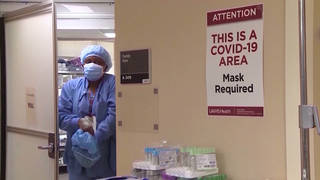
By Amy Goodman & Denis Moynihan
The Winter Solstice, the darkest day of the year, has passed, but the darkest days of the coronavirus pandemic are likely still to come. COVID-19 has killed more than 320,000 people in the U.S., with almost 18 million cases. Deaths and hospitalizations shatter records on a daily basis. While two vaccines have been approved for use in the United States, initial shipments are falling short of the expected doses. African American, Latinx and Native American communities have been hit disproportionately hard by the pandemic, suffering a convergence of systemic racism, lack of access to adequate health care, and, all too often, proximity to pollution sources that heighten the risks posed by COVID-19.
“What we should focus on is equity distribution,” Dr. Taison Bell, critical care and infectious disease physician at the University of Virginia in Charlottesville, said on the Democracy Now! news hour, not long after receiving his first shot of the Pfizer vaccine. “Thinking about our highest-risk providers…providing frontline COVID care.”
Dr. Bell, who is African American, explained in a New Yorker Magazine interview how, during the protests that exploded following the killing of George Floyd by Minneapolis Police in May, he was torn between his duties as a doctor and as a citizen: “Two competing factors, racism and COVID, are killing my community. It feels really unfair that I can’t fight both at the same time.”
Dr. Bell, on Democracy Now!, described a disturbing detail of the Pfizer-BioNTech vaccine distribution:
“Meharry Medical College and their affiliate hospital, Nashville General, were skipped over for the initial Pfizer vaccine shipments. Meharry is the nation’s largest private, historically Black academic sciences center. They’ve been leading on the front combating COVID-19, and their workers are extremely high-risk. Not only that, their president and CEO, Dr. James Hildreth, is on the advisory committee to the FDA that initially reviewed and approved the vaccine.”
Meharry, founded in 1876 during Reconstruction, is also running its own vaccine trials, recruiting people of color to participate to ensure that any vaccine approved is also safe for these heavily impacted communities.
A recent poll by the Pew Research Center found only 42% of African Americans are inclined to get the vaccine, compared to over 60% for whites and the Latinx population.
“Vaccine experiments that have been unethical and exploitative, especially in the developing world, have caught the attention of African Americans and others [and] have been very troubling,” Harriet Washington, medical ethicist and author of “Medical Apartheid: The Dark History of Medical Experimentation on Black Americans,” said on Democracy Now!
Among the examples she documents is the notorious Tuskegee syphilis experiment. From 1932 until 1972, the U.S. Public Health Service promised 400 African American men treatment for syphilis, then lied to them, injecting placebos. The authorities then studied how the disease progressed when purposefully left untreated. Many men died.
Harriet Washington also details the enthusiastic smallpox vaccination experiments conducted by Thomas Jefferson — on his slaves. In 1801, Washington writes, “Jefferson spent that summer vaccinating two hundred of his family’s and his neighbors’ slaves. Only after they escaped illness did Jefferson inject his white family at Monticello.”
Dr. Taison Bell moved to Charlottesville just before the “Unite the Right” white supremacist rally in 2017, which was protesting the proposed removal of a statue of Confederate General Robert E. Lee. One anti-fascist counterprotester, Heather Heyer, was killed by a white supremacist, and scores were injured.
This week, as Dr. Bell received his shot of coronavirus vaccine, the Commonwealth of Virginia replaced its statue of Robert E. Lee in the U.S. Capitol’s Statuary Hall with a statue of a Black woman, Barbara Johns. As a 16-year-old in 1951, Barbara Johns and other African American high school students organized a strike in rural Prince Edward County, Virginia, protesting their grossly unequal school facilities compared to those provided for white students. Their case was taken up by the NAACP, then combined with others in the landmark Brown v. Board of Education Supreme Court decision, ending official school segregation in the U.S.
“It’s not lost on me that I work at an institution that was founded by a member of society who was highly esteemed but thought that people like me were unworthy of being educated,” Dr. Bell said on Democracy Now!, referring to the University of Virginia’s founder, U.S. President Thomas Jefferson. “We have to take down our symbols that are honoring legacies that do not agree with the true nature of American democracy,” he added, “But we also have to make sure that our actions speak for our words…focusing on equitable distribution, thinking about Black and Brown communities from the outset.”
Health equity means free and fair distribution of COVID-19 vaccines and treatments. Anything less will be yet another monument to racism in America.











Media Options